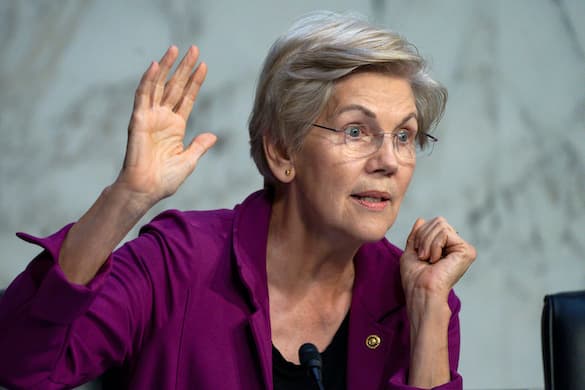Will the Supreme Court Be Elizabeth Warren’s Waterloo?
Nine are set to weigh not only whether student loan forgiveness is unlawful but also whether Senator Warren’s Consumer Financial Protection Bureau is crosswise with the constitution.

The news that the Supreme Court will hear the government’s challenge as to whether the Consumer Financial Protection Bureau is constitutionally funded on the eve of oral arguments over President Biden’s loan forgiveness scheme suggest that the court is readying to move on two cases at the cruxes of executive and congressional power.
The CFPB is the brainchild of Senator Warren and the creation of Congress and President Obama. It was designed to exert an independence apart from even congressional oversight. Years ago, though, it had its single-director structure struck down. It’s now before the Supreme Court because riders of the Fifth Appeals Circuit ruled the entire agency unconstitutional.
While most federal agencies are funded by Congress, the CFPB gets its purse filled by the Federal Reserve Board, even as it enforces and administers 18 federal statutes. The Fifth Circuit castigated that arrangement as “unique” and in violation of Article I Section 9 of the Constitution, which ordains that “no money shall be drawn from the Treasury, but in Consequence of Appropriations made by Law.”
The Fifth Circuit maintained that “Congress’s decision to abdicate its appropriations power under the Constitution, i.e., to cede its power of the purse to the Bureau, violates the Constitution’s structural separation of powers.” The opinion quotes 48 Federalist to the effect that “an elective despotism was not the government we fought for”; but rather one in which power would be “divided and balanced.”
The Fifth Circuit found that the CFPB “financed its rulemaking efforts with funds requisitioned via its unconstitutional funding mechanism” and that its “unprecedented budgetary independence and lack of Congressional oversight” violates both the appropriations clause and the Founders’ commitment to separated powers.
The Biden administration, which is asking the Supreme Court to reverse that holding, contends that the CFB finds its charter in the Dodd-Frank Act of 2010 and points to Cincinnati Soap Co. v. United States. That’s a case from 1937 interpreting the appropriations clause to mean that “no money can be paid out of the Treasury unless it has been appropriated by an act of Congress.”
Any decision by the Supreme Court striking down the Consumer Finance Protection Bureau could turn out to be Senator Warren’s Waterloo. First, however, President Biden faces the prospect of a signal defeat of his own.
The two student loan cases the court will hear this week likewise turn on the appropriations clause. The forgiveness scheme is figured to cost $400 billion; so far, 26 million Americans have signed up. Mr. Biden found support for wiping out the debt not in congressional fiat, but in the Heroes Act, a 9/11-era law that allows the education secretary to act in the event of an emergency.
The administration claimed Covid as one such emergency and predicate for dramatic action, even as it is set to expire in May. The Republican attorneys general and group of students challenging the action wrote to the court that “the administration is once again invoking the Covid-19 pandemic to assert power far beyond anything Congress could have conceived.”
A panel of riders of the Eighth Circuit saw merit enough in that position to unanimously block the order from going into effect, observing that “substantial questions of law which remain to be resolved.” To that end, the court has allotted two hours of argument Tuesday.
The Wall Street Journal, in an important editorial last week, likened President Biden to King John before the Magna Carta. “It’s hard to overstate the stakes in this case,” the Journal wrote. “If a President can get away with this power-play, it’s hard to see what limit would be left on executive rule.”

